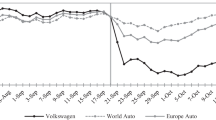Abstract
Equity Crowdfunding Online Portals offer access to investors, resources and fundraising support to numerous equity crowdfunding projects from different industry sectors. In this context, we study investors’ preferences of equity crowdfunding projects in different industries. We present novel empirical evidence revealing differences in startup characteristics across various industry sectors and examine how certain startup characteristics influence business valuations for representative industries in equity crowdfunding. A new business valuation method in equity crowdfunding is introduced to facilitate our analyses.









Similar content being viewed by others
Notes
In a pooling equilibrium, investors have universal preferences for equity crowdfunding start-ups from the same industry sector.
In a separating equilibrium, investors rely on different signals to differentiate start-up quality based on their industry classification.
Industry classification is based on the first two digits of North American Industry Classification System (NAICS) code.
References
Ahlers, G. K. C., Cumming, D., Günther, C., & Schweizer, D. (2015). Signaling in equity crowdfunding. Entrepreneurship Theory and Practice, 39(4), 955–980.
Alford, A. W. (1992). The effect of the set of comparable firms on the accuracy of the price-earnings valuation method. Journal of Accounting Research, 30(1), 94–108.
Allen, F., Gu, X., & Jagtiani, J. (2021). A survey of fintech research and policy discussion. Review of Corporate Finance, 1(3–4), 259–339.
Audretsch, D. B., Lehmann, E. E., Paleari, S., & Vismara, S. (2016). Entrepreneurial finance and technology transfer. The Journal of Technology Transfer, 41, 1–9.
Baird, P. L., Geylani, P. C., & Roberts, J. A. (2012). Corporate social and financial performance re-examined: industry effects in a linear mixed model analysis. Journal of Business Ethics, 109, 367–388.
Block, J., Hornuf, L., & Moritz, A. (2018). Which updates during an equity crowdfunding campaign increase crowd participation? Small Business Economics, 50, 3–27.
Chava, S., & Jarrow, R. A. (2004). Bankruptcy prediction with industry effects. Review of Finance, 8(4), 537–569.
Coakley, J., & Lazos, A. (2021). New developments in equity crowdfunding: A review. Review of Corporate Finance, 1(3–4), 341–405.
Colombo, M. G., Cumming, D. J., & Vismara, S. (2016). Governmental venture capital for innovative young firms. The Journal of Technology Transfer, 41, 10–24.
Colombo, M. G., & Grilli, L. (2005). Founders’ human capital and the growth of new technology-based firms: A competence-based view. Research Policy, 34, 795–816.
Cooper, A. C., Gimeno-Gascon, F. J., & Woo, G. Y. (1994). Initial human and financial capital as predictors of new venture performance. Journal of Business Venturing, 9, 371–395.
Cumming, D., Meoli, M., & Vismara, S. (2019). Investors’ choices between cash and voting rights: Evidence from dual-class equity crowdfunding. Research Policy, 48, 103740.
Gupta, M. C., & Huefner, R. J. (1972). A cluster analysis study of financial ratios and industry characteristics. Journal of Accounting Research, 10(1), 77–95.
Hornuf, L., & Schwienbacher, A. (2018). Market mechanisms and funding dynamics in equity crowdfunding. Journal of Corporate Finance, 50, 556–574.
Johan, S., & Zhang, Y. (2020). Quality revealing versus overstating in equity crowdfunding. Journal of Corporate Finance, 65, 101741.
Konhäusner, P., Thielmann,M., Campian, V., Dan-Cristian, D 2021 "Crowdfunding for Independent Print Media: E-Commerce, Marketing, and Business Development" Sustainability, forthcoming
Lev, B. (1969). Industry averages as targets for financial ratios. Journal of Accounting Research, 7(2), 290–299.
Philippi, S., Schuhmacher, M., & Bastian, N. (2021). Attracting investors in initial coin offerings: The relationship between signals and fundraising success. Review of Corporate Finance, 1(3–4), 455–485.
Piva, E., & Rossi-Lamastra, C. (2018). Human capital signals and entrepreneurs’ success in equity crowdfunding. Small Business Economics, 51, 667–686.
Rauch, A., Frese, M., & Utsch, A. (2005). Effects of human capital and long-term human resources development and utilization on employment growth of small-scale businesses: A causal analysis. Entrepreneurship Theory and Practice, 29, 681–698.
Rauch, A., & Rijsdijk, S. A. (2013). The effects of general and specific human capital on long-term growth and failure of newly founded businesses. Entrepreneurship Theory and Practice, 37, 923–941.
Rossi, A., Vanacker, T., & Vismara, S. (2021). Equity crowdfunding: New evidence from US and UK Markets. Review of Corporate Finance, 1(3–4), 407–453.
Spence, M. (1973). Job market signaling. Quarterly Journal of Economics, 87, 355–379.
Spence, M. (1974). Market signaling: Informational transfer in hiring and related processes. Harvard University Press.
Spence, M. (2002). Signaling in retrospect and the informational structure of markets. American Economic Review, 92, 434–459.
Vismara, S. (2016). Equity retention and social network theory in equity crowdfunding. Small Business Economics, 46, 579–590.
Vismara, S. (2018). Information cascades among investors in equity crowdfunding. Entrepreneurship Theory and Practice, 42, 467–497.
Vismara, S. (2019). Sustainability in equity crowdfunding. Technological Forecasting and Social Change., 141, 98–106.
Waring, G. F. (1996). Industry Differences in the Persistence of Firm-Specific Returns. The American Economic Review, 86(5), 1253–1265.
Author information
Authors and Affiliations
Corresponding author
Additional information
Publisher's Note
Springer Nature remains neutral with regard to jurisdictional claims in published maps and institutional affiliations.
Rights and permissions
About this article
Cite this article
Johan, S., Zhang, Y. Investors’ industry preference in equity crowdfunding. J Technol Transf 47, 1737–1765 (2022). https://doi.org/10.1007/s10961-021-09897-8
Accepted:
Published:
Issue Date:
DOI: https://doi.org/10.1007/s10961-021-09897-8



